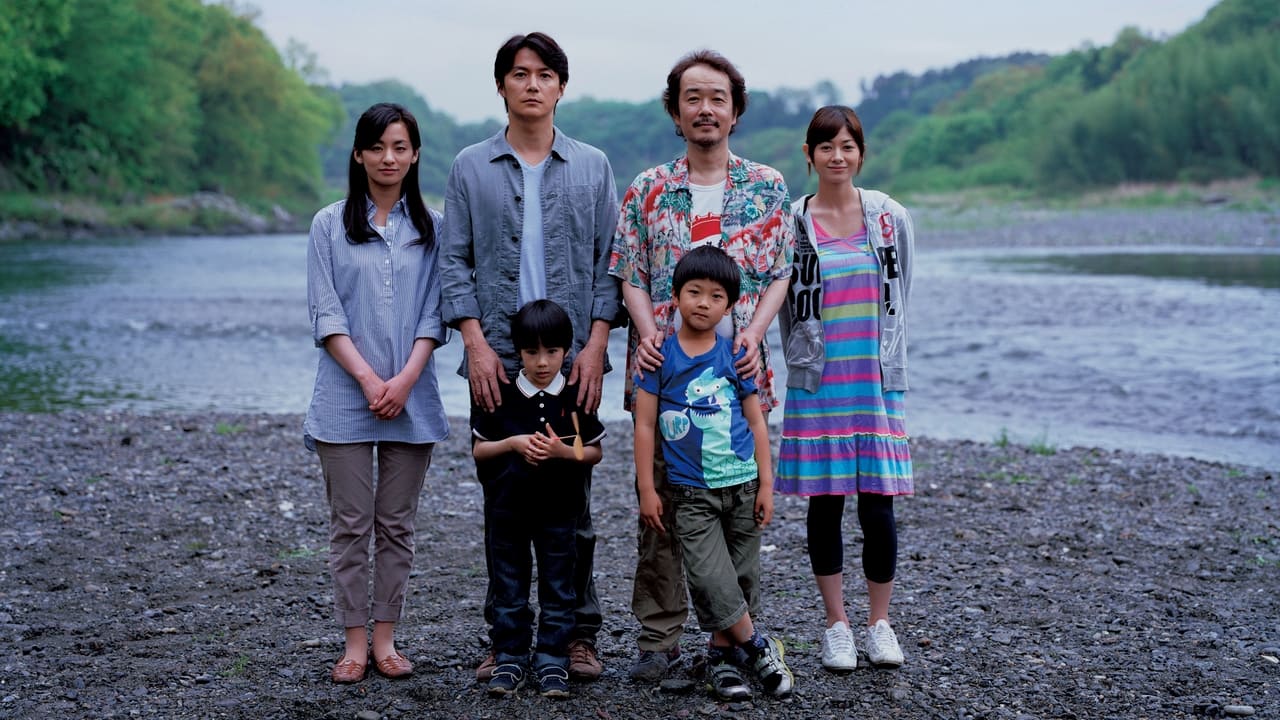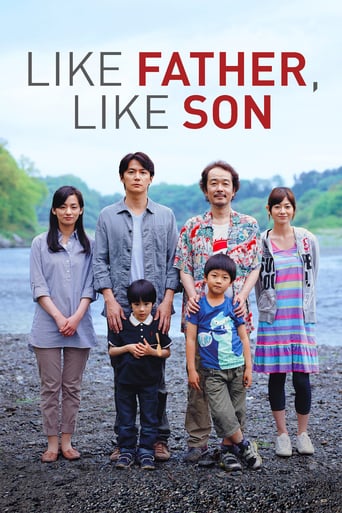

Viewed on Streaming. Subtitles/translations = ten (10) stars. Director Hirokazu Koreeda (who is also credited as the sole screen writer and editor) treads much too lightly on a tale filled with dramatic possibilities. Perhaps the Director feared his story could easy degenerate into an overly melodramatic morass, since he frequently steers his film in the opposite direction resulting in trivia and wooden acting. The plot involves the revelation (after the criminal statue of limitations has expired) that male babies were deliberately switched immediately after birth. This apparently is not unusual at the local hospital that lacks basic controls to prevent these crimes. However, it does employ a lawyer who seems to specialize in such matters. The photo play deals with the discovery of, family reactions to, and "final" remediation of the issue. (Maintaining the status Quo (and minimizing the trauma) via quick reciprocal adoptions would seem like a straight-forward approach, but it is never seriously perused. Perhaps this is because it would abruptly end the story and turn the movie into a short subject!) Impact of vastly different family socioeconomic conditions (one with a rising-Salaryman-star father; the other with a small-shopkeeper father) becomes a major plot point often eclipsing the baby-switching factor (a more accurate movie title might be: "Like Family (Fortunes), Like Son"!). Koreeda seems to have focused his energy on directing his child actors (understandably, as they are usually a major challenge), and, in the process, neglected the performances of his adult actors. Further, those playing the parents in the Salaryman family are miscast. The "score" mostly consists of fragmented piano playing (the Salaryman's "son" is learning to play this instrument) which is overly done. But not completely to the point of boring irritation. Subtitles are excellent with opening and closing credits completely translated. All closing credits can be viewed just in English! An extreme rarity in Japanese films. Doumoarigatou Goziamashita! Worth watching, but don't expect too much. WILLIAM FLANIGAN, PhD.
... View MoreI saw many films of Akira Kurosawa, but i didn't see any Japanese films till then.It is the best Japanese films after Akira Kurosawa made.It is a story of father and son.Ryota who is a successful businessmen,with a happy family.After six years later they received a call from hospital where his baby born.When they reaches at hospital they heard that his baby is swapped with one family .Now the real drama stars.All of actors ,actresses are performed very well in this movie.This movie made a conclusion that "Money is not bigger than love,only showing love is not anything ,spent time with your children,success lies within"
... View MoreI really don't understand what is controversial about this movie. I couldn't relate to the character's so called dilemma. guess you have to be Japanese to understand the conflict. Okay so you find out the kid you are raising is not your kid by birth. The initial realization that someone might have switched your kid with someone else's kid might be shocking but only a completely uncaring parent would disown the child. I really don't see the dilemma.Science has already proved that environment plays a greater role on the development of a young brain than genetics. After the realization is made regarding the origin of the child the choice is obviously an easy one for a caring parent.
... View MoreWe have seen many films delve on the topic of babies being switched at birth. Most of these, the story would revolve around the fortune of the kids. "Like Father, Like Son" is about the parents, particularly the fathers.Ryoko and Midori Nonomiya are a well-to-do couple who had a sweet 6-year old son, Keita. Yukari and Yudai Saiki are a lower middle-class couple with a spirited 6-year old son, Ryusei. One day, they get news that a nurse had switched their sons with each another one at the hospital. With that shocking revelation, both families undergo an emotional ordeal in deciding how to settle their big problem in the best possible way for everyone concerned.Writer-director Hirokazu Koreeda decides to tell the story from the point of view of Ryoko, a driven man at work who was disappointed that his son Keita was not as competitive nor independent as he wanted. When he gets the chance to be father to Ryusei as well, Ryoko discovers that his concept of fatherhood might not be as ideal as he thought.Koreeda sets the contrasting dichotomy a bit too sharply. The Nonomiya home is sedate, quiet, and darkly lit. The Saiki home is messy, noisy and brightly lit. Ryoko (Masaharu Fukuyama)is handsome and smartly- dressed, but he is serious and haughty. Yukari (Riri Furanki) is homely and shoddily-dressed, but he is cheerful and kind. Which kind of father do you think the boys will prefer?The important message of this film will definitely resonate with all fathers who watch this film. Fathers will reflect on their own parenting style and on what kind of father he had been. This film deserves all the praise heaped upon it. It is about time fatherhood is discussed very well in a film.
... View More